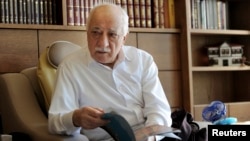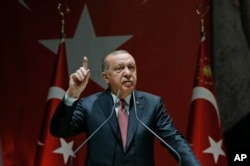The U.S. Justice Department denied it was planning to extradite Turkish cleric Fethullah Gulen, following a media report suggesting Washington was looking into the extradition in exchange for Ankara's easing of its pressure on Saudi Arabia.
"The Justice Department has not been involved in nor aware of any discussions relating the extradition of Fethullah Gulen to the death of Jamal Khashoggi," Justice Department spokeswoman Nicole Navas Oxman said.
NBC News reported Thursday that the Trump administration had been seeking ways to extradite Gulen, as a means to persuade Turkish President Recep Tayyip Erdogan to ease pressure on Saudi Arabia over the killing of Saudi journalist Khashoggi in the Saudi Consulate in Istanbul last month.
Gulen lives in self-imposed exile in Pennsylvania and denies Ankara's accusation of involvement in a failed coup in Turkey in 2016.
On Thursday, the U.S. State Department denied any deal to extradite Gulen, but spokeswoman Heather Nauert said, "We continue to evaluate the material that the Turkish government presents requesting his extradition."
Turkish media reported Friday that President Donald Trump spoke by phone with Erdogan, and the two men "agreed to shed light on the Jamal Khashoggi murder in all its aspects and that any cover-up of the incident should not be allowed."
Gulen's extradition is a top diplomatic priority for Turkey, but Ankara has dismissed any talk of a deal.
"Turkey's pending request for Fethullah Gulen's extradition from the United States and the investigation into Khashoggi's murder are two separate issues. They are not connected in any way, shape or form," said a senior Turkish official, speaking on condition of anonymity.
"At no point did Turkey offer to hold back on the Khashoggi investigation in return for Fethullah Gulen's extradition," he added.
Analysts point out it's doubtful Washington could make such an offer, given Gulen's extradition is a matter for the courts, which experts say is a potentially lengthy and challenging process. Also, given that Erdogan sees the Saudi crown prince as his chief rival in the region, his goals may extend well beyond an extradition.
Trump has sought closer ties with Saudi Arabia to counter Iranian influence in the Middle East, as well as to increase arms deals between Washington and Riyadh.
VOA's Mehmet Toroglu and Dorian Jones contributed to this report.







